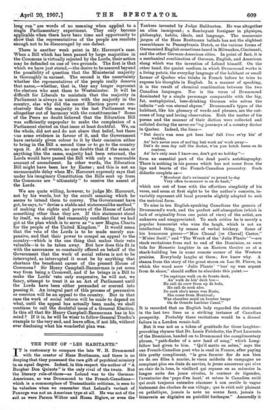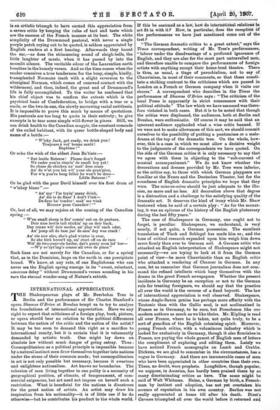THE POET OF " LES HABITANTS."
IT is customary to compare the late W. H. Drummond with the creator of Hans Breitmann, and there is no denying that they possessed the rare gift of psychical mimicry in, an equal degree. Indeed, in this respect the author of "A Burgher Don Quixote" is the only rival of the twain. But the literary .rule-of-three—as Leland was to the German. Americans, so was Drummond to the French-Canadians— which is a commonplace of Transatlantic criticism, is seen to be valueless when we remember that Leland's variant of Panurge was not an American type at all. He was not of the soil as were Parson Wilbur and Hosea Biglow, or even the
Yankees invented by Judge Holiburton. He was altogether an alien immigrant ; a flamboyant foreigner in physique,
philosophy, habits, ideals, and language. The macaroni° jargon of the Hans Breitmann ballads has not the slightest resemblance to Pennsylvania Dutch, or the various forms of Germanised English sometimes heard in Milwaukee, Cincinnati, and the other German-American cities. In point of fact, it is a mechanical combination of German, English, and American slang which was the invention of Leland himself. On the other band, the quaint medium in which Drummond works is a living patois, the everyday language of the habitant or small farmer of Quebec who thinks in French before he tries to express his thoughts in English. In a manner of speaking, it is the result of chemical combination between the two Canadian languages. Nor is the verse of Drummond dominated by a single personage comparable with the big, fat, metaphysical, beer-drinking German who solves the infinite "ash von eternal ehpree." Drummond's types of the habitant, like his glossary of words and phrases, are the out- come of long and loving observation. Both the matter of his poems and the manner of their diction were collected and collated during the never-en,' ing journeys of a country doctor in Quebec. Indeed, the lines- " But dere's wan man got bees ban' full t'roo ev'ry kin' of wedder,
An' he's never sure of noting but work an' work away- Dat's de man dey call the doctor, w'en you ketch heem on de centres, An' he's only.man I know-me, don't got no holiday "—
form an essential part of the dead poet's autobiography. There is nothing in his poems which has not come from the lips and hearts of the French-Canadian peasantry. Such didactic couplets as- " Mooshrat dat's swimmin' so proud to-day
Very offen to-morrow is on de hash," which are out of tone with the effortless simplicity of his verse, and seem at first sight to be the author's conceits, in- variably represent old local proverbs slightly adapted to suit the metrical form.
To nine in ten English-speaking Canadians the genesis of Drummond's work, and the perfect self-abnegation (which is lack of originality from one point of view) of the artist, are unknown and unappreciated. To such critics he is merely a popular humourist who wins the laugh, which is not an intellectual thing, by means of verbal trickery. Some of his humorous pieces—" Mon Chanel [= Cheval] Castor,"• "M'sieu Snit'," and "The Wreck of the 'Julie Plante' "—are stock recitations from end to end of the Dominion, as sure bids for Homeric laughter in an Eastern theatre as at a shack-building bee in some remote corner of the Western prairies. Everybody laughs at them; few know why. A stanza from the story of the great storm on Lac St. Pierre, in which the wood scow 'Julie Plante' "bus' up wan arpent from de shore," should suffice to elucidate this point :—
"De captions walk on de fronts deck, An' walk de hin' deck too— He call de crew from up de hole, He call de cook also.
De cook she's name was Rosie, She come from Montreal; Was chambre maid on lumber barge On de Grande Lachine Canal."
It is recorded that an English lady regarded the statement in the last two lines as a striking instance of Canadian prosperity. Probably these recitations would be a dismal failure in a London music-hall.
But it was not as a token of gratitude for these laughter- provoking rhymes that Dr. Louis Frechette, the Poet Laureate of the Dominion, banded on to Drummond the complimentary phrase, "path-finder of a new land of song," which Long- fellow had given to him. " Qu'il matte en scene," says the one French-Canadian poet who is read in France, after paying this pretty compliment, "le gros fermier fier de son hien ou de, sea files I. metier, le vim= medecin de campagne no comptant plus sea &ate de service, le jeune amoureux qui rave an chair de la lime, le vieillard qui repaase en sa memoire Is longue suite des jours revolus, he contour de legendes, l'aventurier des 'pays d'en taut,' et mime he Canadien exile qui croit toujours entendre resonner h son oreille le vague tintement des cloches de son village; qua le recit soit plaisant on pathetique, jamais la note ne scone faux, jamais la bizarrerie ne degenere en puerilite burlesque." Assuredly it is an aftistic ti•lumph to have earned this appreciation from a severe critic by keeping the rules of tact and taste which are the essence of the French manner at its best. The white simplicity of the Draramond pastoral, with never a single purple patch crying Ont to be quoted, is seldom appreciated by English readers at a first hearing. Afterwards they haunt the eitr,—as does the shimmering sound of sleigh-bells, the little laughter of music, when it has passed by into the moonlit silence. The veritable odour of the Laurentian earth breathes in the homely verses. And so the time comes when the reader conceives a true tenderness for the busy, simple, kindly,. transplanted Normans (each with a slight reversion to the aboriginal Norman, which comes of renewed contact with the wilderness), and then, indeed, the great end of Drummond's life is fully accomplished. To the writer he confessed that his chief object was to confirm the entente which is the psychical basis of Confederation, to bridge with a tear or a smile, or the two-in-one, the slowly narrowing racial antithesis. It is impossible to prove this much by means of quotations. His pastorals are too long to quote in their entirety ; to give excerpts is to tear some simple wild-flower in pieces. Still, we can drink health to the Canadian magpie, the constant comrade of the exiled habitant, with its queer bottle-shaped body and name of a bottle :— " W'isky Jack, get ready, we drink you
Tonjours k vet' bonne sante!
Bapteme !"
Or echo the wish of the eldest Jean Baliste:—
"But leetle Bateese I. Please don't forget We radar you're stayin' de small boy yet ! So chase de chicken an' mak' dam scare An' do w'at you ink wit' your ole gran'pere, For w'n you're beeg feller he won't be dare—
Little Bateese !"
Or be glad with the poor Devil himself over his first dram of " w'iskey blanc "
" An' say 'I'm tryin' many drink, An' dis is de fines' I don't t'ink-
De firse ha' tonder ! mak' me wink Hooraw pour Canadaw!'"
Or, last of all, we may rejoice at the coining of the Canadian spring :— " W'en small sheep is firs' comin' out on de pasture,
Deir nice leetle tail stickiii up on deir back,
Day ronne wit' deir sander, an' play wit' each oder, An' jomp all de tam jus' de sam' dey was crack !
An' ole cow also, she's glad winter is over, So she kick bersel up, an' start off on de race Wit' de two-year-ole heifer, flat's party soon ler her- -W'y ev'ryt'ing's crazes all over de place."
Such lines are not merely for the Canadian, or for a spring that, as in the Dominion, leaps on the earth in one precipitate bound. We know, at any rate, of one Englishman who can never see the English spring emerge in its "sweet, reluctant, amorous delay" without Drummond's verses sounding in his ears the eternal wonder-song of Nature's rebirth. •











































 Previous page
Previous page